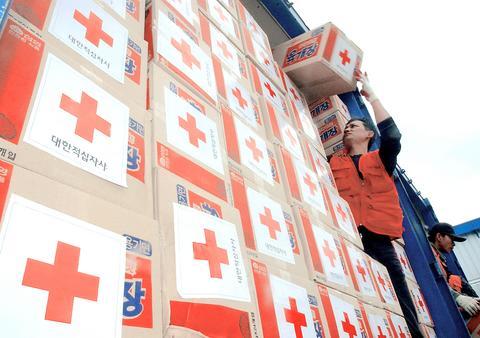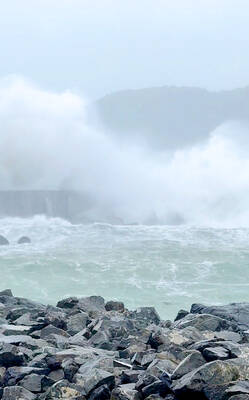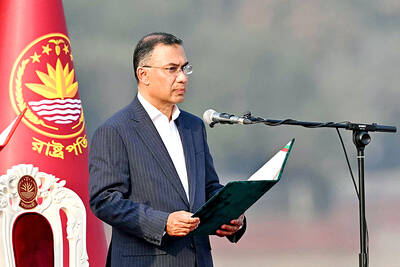The UN urgently appealed yesterday for 1,000 tonnes of food to feed survivors of North Korea's deadly train explosion as Russia flew in emergency relief and South Korea sought ways to deliver aid.
World Food Program (WFP) officials said they had to dip into stocks used to feed millions of hungry North Koreans to help survivors of last Thursday's blast that killed at least 161 people and injured 1,300.

PHOTO: AP
"We intend to launch a flash appeal today for emergency food aid for North Korea, for the victims of the blast. We will ask for a total of about 1,000 tonnes," Tony Banbury, WFP's regional director for Asia, told a news conference in Beijing.
A second WFP official stressed that more than one-quarter of the 23 million people of North Korea remained dependent on food aid years after the isolated communist state was hit by famine.
"While we are all focusing on this accident, we should not forget the larger context," said Masood Hyder, the UN Development Program's coordinator in North Korea.
"The WFP is supporting 6.5 million people who do not have enough to eat," he said.
Russia's Emergency Situations Ministry had flown 30 tonnes of supplies to Pyongyang, the Interfax news agency said.
The Il-76 plane took 13 tonnes of medicine, 54,000 disposable blood transfusion systems and large tents and blankets for victims of the blast at Ryonchon, it said.
A South Korean delegation was holding talks in North Korea over how to deliver relief aid. South Korea was quick to offer US$1 million to its communist neighbor after Thursday's blast, but the reclusive North rejected the speediest aid route.
North Korea, wary of letting its people see vehicles carrying largesse from the prosperous South, prefers to receive the goods by sea instead of over the land border it shares with the South. Talks were being held at the North Korean city of Kaesong.
Hundreds of gravely injured victims, many of them children, needed urgent medical supplies, international aid officials said.
UN officials said that local hospitals not destroyed in the cataclysmic blast were overwhelmed and needed urgent assistance because of a chronic lack of medicines and supplies.
Scores of elementary-school children were among those killed and hurt when two trains exploded, obliterating a school and large parts of the town of Ryongchon near the Chinese border.
In North Korea's first published casualty toll, the official KCNA news agency said on Monday at least 150 people had been killed, 1,300 were injured and others were missing. The latest figures from international organizations put deaths at 161.
The Red Cross launched an emergency appeal on Monday to raise US$1.21 million to buy food, clothing and cooking fuel for up to 10,000 people affected by the blast.
"Thousands of people have lost most or all of what they had and they were already struggling," Niels Juel, regional relief coordinator for the International Federation of Red Cross and Red Crescent Societies, said in a statement.
US Secretary of State Colin Powell said the US, already a major food donor to North Korea, was coordinating with the UN to provide financial and other support.
"We will be making an offer, some financial assistance, and we are waiting to see what the need is and what else we might be able to do," Powell told reporters.
He said the offer was humanitarian and not linked to US efforts to coax Pyongyang to hold talks soon on ending its nuclear weapons ambitions.
Japan also set aside a row over abducted Japanese to extend US$100,000 in relief aid.
Australia promised US$182,000 in response to the Red Cross appeal.
South Korean analysts said North Korea had rejected the overland shipments as a matter of pride. South Koreans are 15 times wealthier than Northerners.
Sea shipments take at least twice as long as the 10-hour drive from Seoul to Ryongchon, and bad weather delayed the departure of the first ship of dried noodles and blankets. South Korea's acting president Goh Kun suggested flying the goods in.
Even Seoul media outlets that are staunchly anti-communist urged the government to help the North to save face.

Heavy rain and strong winds yesterday disrupted flights, trains and ferries, forcing the closure of roads across large parts of New Zealand’s North Island, while snapping power links to tens of thousands. Domestic media reported a few flights had resumed operating by afternoon from the airport in Wellington, the capital, although cancelations were still widespread after airport authorities said most morning flights were disrupted. Air New Zealand said it hoped to resume services when conditions ease later yesterday, after it paused operations at Wellington, Napier and Palmerston North airports. Online images showed flooded semi-rural neighborhoods, inundated homes, trees fallen on vehicles and collapsed

‘COST OF DEFECTION’: Duterte’s announcement could be an effort to keep allies in line with the promise of a return to power amid political uncertainty, an analyst said Philippine Vice President Sara Duterte yesterday announced she would run for president of the Southeast Asian nation of 116 million in 2028. Duterte, who is embroiled in a bitter feud with Philippine President Ferdinand Marcos Jr, was impeached last year only to see the country’s Supreme Court throw the case out over procedural issues. Her announcement comes just days before her father, former Philippine president Rodrigo Duterte, begins a pretrial hearing at the International Criminal Court (ICC) in the Netherlands over crimes against humanity allegedly committed as part of a brutal crackdown on drugs. “I offer my life, my strength and my future

NOT YET THERE: While the show was impressive, it failed to demonstrate their ability to move in unstructured environments, such as a factory floor, an expert said Dancing humanoid robots on Monday took center stage during the annual China Media Group’s Spring Festival Gala, China’s most-watched official television broadcast. They lunged and backflipped (landing on their knees), they spun around and jumped. Not one fell over. The display was impressive, but if robots can now dance and perform martial arts, what else can they do? Experts have mixed opinions, with some saying the robots had limitations and that the display should be viewed through a lens of state propaganda. Developed by several Chinese robotics firms, the robots performed a range of intricate stunts, including martial arts, comedy sketches and choreographed

POST-UPRISING: Bangladesh Nationalist Party lawmakers were yesterday expected to formally elect Tarique Rahman as their leader and new head of government Bangladesh’s prime minister-to-be Tarique Rahman and lawmakers were yesterday sworn into parliament, becoming the first elected representatives since a deadly 2024 uprising. Rahman is set to take over from an interim government that has steered the country of 170 million people for 18 months since the autocratic government of Sheikh Hasina was overthrown. The lawmakers, who promised loyalty to Bangladesh, were sworn in by Chief Election Commissioner AMM Nasir Uddin. Bangladesh Nationalist Party (BNP) lawmakers are expected to formally elect Rahman as their leader, with President Mohammed Shahabuddin then to administer the oath of office to the prime minister and his ministers